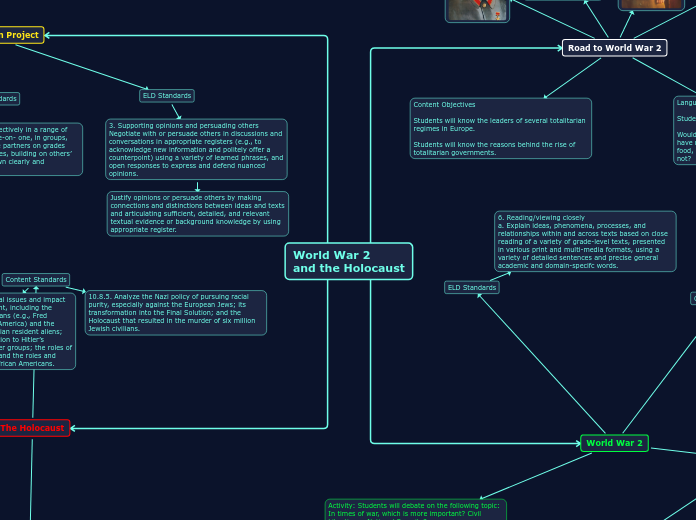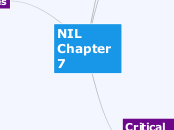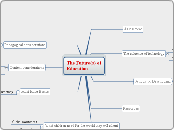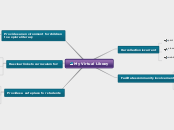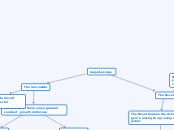World War 2
and the Holocaust
The Holocaust
Webercise Activity: Students will form into groups and will use their cellphones to access the internet and answer one of the question sets.
Set 2: Questions regarding Heroes of the Holocaust:
What is their name?
What did they do before the Holocaust?
What did they do to protect Jews from the Nazi Party?
Were they successful?
If yes, how many Jews were they able to save?
If not, were they punished for protecting Jews?
Set 1: Questions regarding Holocaust Survivors:
What is their name?
What did they do before the Holocaust?
Where did they hide?(If applicable)
Did they get caught?(If applicable)
What camp were they sent to?(If applicable)
What did they do after the war?
2. Determine two or more central ideas of a text and analyze their development over the course of the text, including how they interact and build on one another to provide a complex analysis; provide an objective summary of the text.
10.8.5. Analyze the Nazi policy of pursuing racial purity, especially against the European Jews; its transformation into the Final Solution; and the Holocaust that resulted in the murder of six million Jewish civilians.
The Manhattan Project
Activity: Students will debate on the following topic:
In times of war and conflict, do the ends justify the means?
Students will use the decision to drop the atomic bombs on Japan as a foundation for their arguments.
3. Supporting opinions and persuading others Negotiate with or persuade others in discussions and conversations in appropriate registers (e.g., to acknowledge new information and politely offer a counterpoint) using a variety of learned phrases, and open responses to express and defend nuanced opinions.
Justify opinions or persuade others by making connections and distinctions between ideas and texts and articulating sufficient, detailed, and relevant textual evidence or background knowledge by using appropriate register.
1. Initiate and participate effectively in a range of collaborative discussions (one-on- one, in groups, and teacher-led) with diverse partners on grades 11–12 topics, texts, and issues, building on others’ ideas and expressing their own clearly and persuasively.
11.7.7 Discuss the decision to drop atomic bombs and the consequences of the decision (Hiroshima and Nagasaki).
World War 2
Activity: Students will debate on the following topic:
In times of war, which is more important? Civil Liberties or National Security?
Studies will use Korematsu v. United States as a source to create their arguments.
ELD Standards
6. Reading/viewing closely
a. Explain ideas, phenomena, processes, and relationships within and across texts based on close reading of a variety of grade-level texts, presented in various print and multi-media formats, using a variety of detailed sentences and precise general academic and domain-specifc words.
Literacy Standards
Integrate and evaluate multiple sources of information presented in diverse formats and media in order to address a question or solve a problem.
Determine two or more central ideas of a text and analyze their development over the course of the text, including how they interact and build on one another to provide a complex analysis; provide an objective summary of the text.
Determine an author’s point of view or purpose in a text in which the rhetoric is particularly effective, analyzing how style and content contribute to the power, persuasiveness, or beauty of the text.
Content Standards
11.7.5 Discuss the constitutional issues and impact of events on the U.S. home front, including the internment of Japanese Americans (e.g., Fred Korematsu v. United States of America) and the restrictions on German and Italian resident aliens; the response of the administration to Hitler’s atrocities against Jews and other groups; the roles of women in military production; and the roles and growing political demands of African Americans.
11.7.1 Examine the origins of American involvement in the war, with an emphasis on the events that precipitated the attack on Pearl Harbor.
Road to World War 2
Language Objectives:
Students will debate the following question:
Would you like to live in a government where you have no rights AT ALL, but you are provided with food, water, and a roof over your head? Why or Why not?
Content Objectives
Students will know the leaders of several totalitarian regimes in Europe.
Students will know the reasons behind the rise of totalitarian governments.
